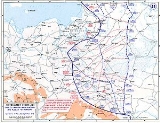
Battle of Bolimov
Encyclopedia
The Battle of Bolimov was an inconclusive battle of World War I
fought on January 31, 1915 between Germany
and Russia
and considered a preliminary to the Second Battle of the Masurian Lakes
.
led by August von Mackensen
attacked the Russian Second Army, under General Smirnov, near the Polish
village of Bolimów
, lying on the railway line connecting Łódź and Warsaw
.
The Battle of Bolimów was the first attempt by the Germans at a large-scale use of poison gas; the several thousand gas shells they fired proved unsuccessful when the xylyl bromide
—a type of tear gas—was blown back at their own lines. The gas caused few, if any, casualties, however, since the cold weather caused it to freeze, rendering it ineffective.
The failure of the xylyl bromide caused the German commanders to call off their attack. In response, the Russians sent 11 divisions, led by Vasily Gurko
to launch a counterattack; German artillery
repelled the Russian troops, who suffered 40,000 casualties.
World War I
World War I , which was predominantly called the World War or the Great War from its occurrence until 1939, and the First World War or World War I thereafter, was a major war centred in Europe that began on 28 July 1914 and lasted until 11 November 1918...
fought on January 31, 1915 between Germany
German Empire
The German Empire refers to Germany during the "Second Reich" period from the unification of Germany and proclamation of Wilhelm I as German Emperor on 18 January 1871, to 1918, when it became a federal republic after defeat in World War I and the abdication of the Emperor, Wilhelm II.The German...
and Russia
Russian Empire
The Russian Empire was a state that existed from 1721 until the Russian Revolution of 1917. It was the successor to the Tsardom of Russia and the predecessor of the Soviet Union...
and considered a preliminary to the Second Battle of the Masurian Lakes
Second Battle of the Masurian Lakes
The Second Battle of the Masurian Lakes, also known as the Winter Battle of the Masurian Lakes, was the northern part of the Central Powers' offensive on the Eastern Front in the winter of 1915...
.
Battle
The German Ninth ArmyGerman Ninth Army
The 9th Army was a World War II field army.The 9th Army was activated on May 15, 1940 with General Johannes Blaskowitz in command.-1940:The 9th Army first saw service along the Siegfried Line when it was involved in the invasion of France...
led by August von Mackensen
August von Mackensen
Anton Ludwig August von Mackensen , born August Mackensen, was a German soldier and field marshal. He commanded with success during the First World War and became one of the German Empire's most prominent military leaders. After the Armistice, Mackensen was interned for a year...
attacked the Russian Second Army, under General Smirnov, near the Polish
Congress Poland
The Kingdom of Poland , informally known as Congress Poland , created in 1815 by the Congress of Vienna, was a personal union of the Russian parcel of Poland with the Russian Empire...
village of Bolimów
Bolimów
Bolimów is a village in Skierniewice County, Łódź Voivodeship, in central Poland. It is the seat of the Gmina called Gmina Bolimów. It lies approximately north of Skierniewice and north-east of the regional capital Łódź. The village has a population of 930...
, lying on the railway line connecting Łódź and Warsaw
Warsaw
Warsaw is the capital and largest city of Poland. It is located on the Vistula River, roughly from the Baltic Sea and from the Carpathian Mountains. Its population in 2010 was estimated at 1,716,855 residents with a greater metropolitan area of 2,631,902 residents, making Warsaw the 10th most...
.
The Battle of Bolimów was the first attempt by the Germans at a large-scale use of poison gas; the several thousand gas shells they fired proved unsuccessful when the xylyl bromide
Xylyl bromide
Xylyl bromide, also known as methylbenzyl bromide or T-stoff, is a poisonous organic chemical compound with the formula C8H9Br, formerly used as a tear gas...
—a type of tear gas—was blown back at their own lines. The gas caused few, if any, casualties, however, since the cold weather caused it to freeze, rendering it ineffective.
The failure of the xylyl bromide caused the German commanders to call off their attack. In response, the Russians sent 11 divisions, led by Vasily Gurko
Vasily Gurko
Vasily Iosifovich Gurko served for a brief period as a Chief-of-Staff of the Imperial Russian Army before being forced out of the country in exile following the October Revolution of 1917.- Biography :Son of the Iosif Gurko...
to launch a counterattack; German artillery
Artillery
Originally applied to any group of infantry primarily armed with projectile weapons, artillery has over time become limited in meaning to refer only to those engines of war that operate by projection of munitions far beyond the range of effect of personal weapons...
repelled the Russian troops, who suffered 40,000 casualties.

